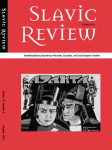
SLAVIC REVIEW
metrics 2024
Illuminating the Tapestry of Slavic Heritage.
Introduction
SLAVIC REVIEW, published by Cambridge University Press, is a prominent academic journal that delves into the rich tapestry of Slavic studies, focusing on the cultural, historical, and social dimensions of Slavic regions. With an ISSN of 0037-6779 and an E-ISSN of 2325-7784, this journal holds a significant position within the academic community, ranking in the Q2 category of Arts and Humanities (miscellaneous) and achieving a Q1 rating in Cultural Studies as of 2023. Notably, the journal has consistent relevance in the field, as evidenced by its Scopus rankings—Rank #260 in Cultural Studies and Rank #204 in Miscellaneous Arts and Humanities. Since its converged years starting from 1966 up to the present, SLAVIC REVIEW has been an essential resource for researchers, professionals, and students aiming to deepen their understanding of Slavic cultures. While it operates on a traditional subscription model and does not provide open access, the journal remains a vital platform for pioneering research and critical discourse in Slavic studies.
Metrics 2024
 0.33
0.33 1.30
1.30 1.10
1.10 41
41Metrics History
Rank 2024
Scopus
IF (Web Of Science)
JCI (Web Of Science)
Quartile History
Similar Journals

Konstantinove Listy-Constantines Letters
Advancing interdisciplinary dialogue in history, philosophy, and religion.Konstantinove Listy - Constantines Letters is a premier academic journal published by the Constantine Philosopher University in Nitra, Slovakia. With a focus on the interdisciplinary exploration of historical, philosophical, and religious studies, this journal has established itself as a significant platform for scholarly discourse since its inception in 2015. The journal's impressive rankings—Q1 in History and Religious Studies, along with Q2 in Philosophy—demonstrate its commitment to high-quality research, concurrent with its strong performance in Scopus rankings, placing it in the 80th percentile for both Religious Studies and History disciplines. As an integral part of the academic landscape, Konstantinove Listy invites researchers, professionals, and students alike to contribute to its mission of advancing knowledge and understanding in these vital fields. While the journal operates under traditional publishing, it is recognized for its accessibility and contribution to fostering a vibrant scholarly community.
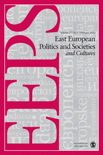
EAST EUROPEAN POLITICS AND SOCIETIES
Advancing critical insights into post-socialist transformations.EAST EUROPEAN POLITICS AND SOCIETIES, published by SAGE Publications Inc, stands as a vital academic resource within the fields of sociology and political science, focusing primarily on the dynamics and transformations of Eastern Europe. With an ISSN of 0888-3254 and an E-ISSN of 1533-8371, this quarterly journal has been contributing to scholarly discourse since 1986 and continues to be a crucial platform for the exchange of innovative research and critical insights, boasting a commendable Q2 ranking in its category as of 2023. Researchers, professionals, and students engaged in the exploration of post-socialist transitions, identity politics, and socio-economic challenges will find this journal an essential tool for understanding the complexities of the region. While the journal offers limited open access options, its presence in academic databases ensures that cutting-edge research remains accessible to a broader audience. With a Scopus rank of #606 out of 1466 in the social sciences category, EAST EUROPEAN POLITICS AND SOCIETIES continues to shape the intellectual landscape and discourse surrounding Eastern Europe.

New Perspectives
Advancing critical dialogue in Political Science and International Relations.New Perspectives is a pivotal academic journal published by SAGE Publications Inc, dedicated to advancing the fields of Political Science and International Relations. With a focus on innovative research and critical analysis, it has established a notable presence since its inception in 2015, currently holding a Q3 ranking in its category for 2023. Based in the Czech Republic, New Perspectives has a robust Scopus rank of #292 out of 706, placing it in the 58th percentile among social science journals. This underscores its significance in fostering scholarly dialogue and presenting fresh ideas in a rapidly evolving global landscape. While not open access, the journal attracts a diverse readership, including researchers, professionals, and students who are keen on exploring emerging trends and insights in political theory and international discourse. The journal’s commitment to high-quality scholarship makes it an essential resource for those aiming to contribute to and engage with contemporary political challenges.
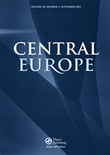
Central Europe
Connecting Scholars to Central Europe's Complex DynamicsCentral Europe is a peer-reviewed journal published by Routledge Journals, Taylor & Francis Ltd, focusing on the interdisciplinary exploration of the cultural, political, and social dynamics within Central European countries. Since its inception in 2003, the journal has become a platform for the dissemination of high-quality research, offering vital insights into the region's complex narratives through studies in Arts and Humanities, Cultural Studies, Political Science, and Sociology. Despite currently holding a Q4 quartile ranking in multiple categories, the journal serves as an essential resource for researchers and professionals seeking to enrich their understanding of Central Europe's multifaceted contexts. Published in the United Kingdom, it presents opportunities for both established and emerging scholars to contribute to the discourse on contemporary issues and foster an academic community. Access to the journal is available through institutional affiliations and purchases, making it a crucial outlet for discussion and engagement in this evolving academic landscape.

SLAVIC AND EAST EUROPEAN JOURNAL
Advancing Knowledge in Slavic Linguistics and LiteratureThe Slavic and East European Journal (ISSN: 0037-6752) is a distinguished publication focused on the rich tapestry of Slavic and Eastern European cultures, languages, and literatures. Published by the Ohio State University’s Department of Slavic and East European Languages & Culture, this journal serves as a vital platform for scholars and researchers keen on exploring linguistic diversity and cultural heritage in these regions. With a wide-ranging scope, the journal addresses significant topics within Cultural Studies, Linguistics, and Literature, currently categorized in Q4 and Q3 quartiles across various academic metrics. Although it does not offer open access, anticipation is high among academics seeking to contribute or access cutting-edge research that pushes the boundaries of understanding these complex fields. As it converges from 2009 to 2024, the Slavic and East European Journal continues to uphold its commitment to academic excellence and community engagement, making it an essential resource for anyone dedicated to the study of Slavic and Eastern European traditions.
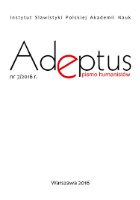
Adeptus
Exploring Cultural Richness in Slavic ResearchAdeptus is a pioneering open-access journal published by the Polish Academy of Sciences, Institute of Slavic Studies, specializing in Slavic studies and cultural research. Since its inception in 2014, the journal has aimed to foster scholarly dialogue and advance knowledge across various disciplines related to Slavic languages, literature, history, and sociology. With an ISSN of 2300-0783, Adeptus has positioned itself as a vital resource for researchers, professionals, and students engaged in Slavic studies, offering a platform for high-quality, peer-reviewed articles that explore diverse topics within the field. The journal's open-access model promotes accessibility and dissemination of knowledge, making it a significant contributor to the academic landscape. Located in Warsaw, Poland, Adeptus continues to thrive as a key outlet for innovative research, inviting submissions that embody rigorous scholarship and insightful perspectives.
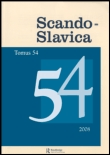
Scando-Slavica
Fostering Dialogue Between Scandinavian and Slavic StudiesScando-Slavica is a renowned academic journal published by ROUTLEDGE JOURNALS, TAYLOR & FRANCIS LTD, specializing in the rich interplay of Scandinavian and Slavic studies. With its ISSN 0080-6765 and E-ISSN 1600-082X, the journal has been a critical resource for scholars since its inception in 1954, covering a wide range of disciplines including archaeology, cultural studies, history, linguistics, and literature. As of 2023, it has consistently ranked in the third quartile across various categories, indicating its influential role in disseminating innovative research within the arts and humanities. With a focus on interdisciplinary dialogue, Scando-Slavica aims to foster a deeper understanding of cultural exchanges and linguistic connections, making it an essential read for researchers, professionals, and students interested in exploring the complexities of Nordic and Slavic interactions. While currently not an open access journal, its contributions have garnered substantial citations, bolstering its academic impact and relevance in a diverse scholarly landscape.

Eastern Journal of European Studies
Exploring the rich tapestry of European studies since 2010.Eastern Journal of European Studies is a distinguished open-access platform published by UNIV ALEXANDRU IOAN CUZA, CENTRUL STUDII EUROPENE, dedicated to advancing research and scholarship in the fields of Economics, History, Political Science, and Sociology. Since its inception in 2010, this journal has been committed to fostering a rich dialogue among scholars and practitioners, emphasizing interdisciplinary approaches to European studies. With a notable Q1 ranking in History and Q3 rankings in other social sciences categories as of 2023, the journal holds a strong position in both European and global research landscapes. As part of the Scopus indexing, it stands out with impressive percentiles, including the 90th percentile in History. By providing an open-access platform, the journal ensures that critical research is widely accessible, bridging gaps between academia and the public. It serves as an essential resource for researchers, policymakers, and students interested in exploring Europe’s complex dynamics, making significant contributions to contemporary debates and policy implications.
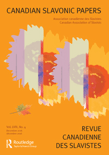
Canadian Slavonic Papers
Exploring the Depths of Slavic ScholarshipCanadian Slavonic Papers, published by Routledge Journals, Taylor & Francis Ltd, is an esteemed peer-reviewed journal dedicated to the exploration of the Slavic, Eastern European, and Russian domains, fostering scholarly dialogue across multiple disciplines. With a robust focus on Cultural Studies, History, Linguistics, and Literature, this journal has firmly established its presence in the academic community, as evidenced by its Q1 ranking across various categories in 2023. Since its inception, Canadian Slavonic Papers has been a vital platform for researchers, professionals, and students alike, providing an invaluable repository of knowledge and insights from 1977 to the present. While not an open-access journal, it remains accessible through institutional subscriptions, ensuring a wide dissemination of scholarship. Located in the United Kingdom, the journal continues to contribute significantly to the understanding of Slavic studies within a global context, making it essential reading for anyone invested in this dynamic field.
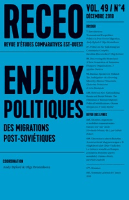
REVUE D ETUDES COMPARATIVES EST-OUEST
Advancing Knowledge: Critical Perspectives on Global InteractionsREVUE D ETUDES COMPARATIVES EST-OUEST is a distinguished academic journal published by PRESSES UNIV FRANCE, dedicated to the critical exploration of comparative studies in the social sciences, particularly focused on Finance and Political Science. Operating since its inception in 1978, this journal has evolved into an essential resource for researchers examining the dynamics between Eastern and Western paradigms, offering insights that bridge regional perspectives. Although it holds a Q4 classification in both Finance and Political Science and International Relations categories for 2023, it serves as a platform for emerging voices and established scholars alike to publish meaningful research. With Scopus rankings placing it within the 33rd percentile for Political Science and 13th percentile for Finance, the journal continues to foster scholarly dialogue and encourages submissions that contribute to the broader understanding of comparative analysis. While currently not an open-access journal, it provides a valuable forum for innovative research that can significantly impact both academic and policy-making communities. This makes REVUE D ETUDES COMPARATIVES EST-OUEST an important journal for anyone looking to deepen their understanding of international relationships and economic interactions.